
I am convinced that — like its obvious predecessor, La Dolce Vita (1960) — The Great Beauty ought to have retained its Italian title, La Grande Bellezza, for its American release. It not only just plain sounds better, it underscores the movie’s innately Italian nature. By any title, however, this contender for Best Foreign Language Oscar is at least something like a masterpiece. (I’m hesitant to call anything I saw for the first time little more than a month ago a masterpiece.) It came out of nowhere so far as I was concerned, and it resulted in me reworking my ten best list. (Plus, it sent me scrambling to see more films by Paolo Sorrentino.)
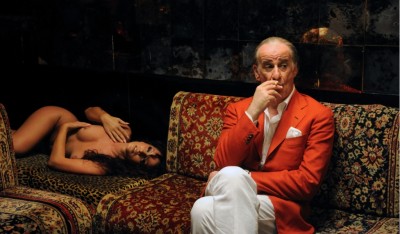
As noted above — and by others — Sorrentino’s film owes something to Fellini’s La Dolce Vita. At one point it directly references it. But don’t take the comparison too far. The Great Beauty is much more world-weary. Its main character, Jep Gambardella (Toni Servillo, Gomorrah), is a 65-year-old writer, not a youngish journalist. Altering a phrase from John Cameron Mitchell’s Shortbus (2006), it reminds me of La Dolce Vita but with less hope. And it’s also reminiscent of 8 1/2 — yet with a voice distinctly its own. It is a fresh and vital voice that never seems to question itself.
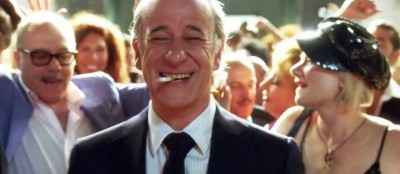
Viewers in search of a straightforward narrative are apt to be disappointed by The Great Beauty. It has a story arc and a series of events that sometimes contain resolutions, but it’s less a narrative in the traditional sense than it’s about a character taking stock of himself and the world he lives in. Following a sequence establishing the film’s locale in Rome, it moves to Jep’s 65th birthday party to illustrate a particular segment of the city’s inhabitants. These are the city’s “beautiful” people — affluent, successful, important, trendy — despite the fact that many (even most) of them are decidedly no longer in their prime.
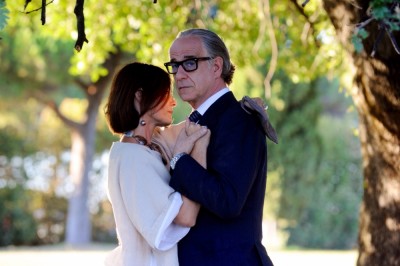
They revel in excess, talking trash and pretentious twaddle (“The only good jazz these days comes from Ethiopia,” “He’s a talented conceptual artist — he covers basketballs with confetti. He’s sensational,” etc.) At the center of all this is Jep — a man who wrote a highly regarded novel 40 years earlier but has since turned his attentions to being a sort of journalist, tastemaker and the ultimate man-about-town that everybody who’s anybody knows. It’s a brilliant existence — and a brilliantly cynical one — until news of the death of an old girlfriend sends him in search of himself. The search takes place in the present, past and at those points where the two sometimes intersect.
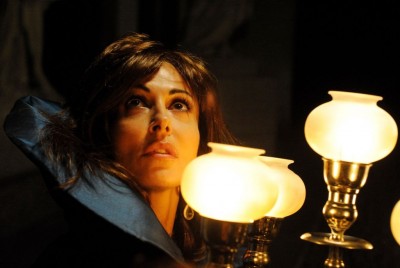
That is the absolute bare bones of the richness of the film. It gives no real feel for the incredible emotional and visual banquet that is The Great Beauty. Events range from the absurd and the grotesque to the stunningly beautiful to the tantalizingly enigmatic to the heartbreakingly sad. The segment dealing with Jep’s ill-fated romance with a 42-year-old stripper, Ramona (Sabrina Ferilli), is easily the most touching. It contains the film’s most quietly beautiful and strange scene. Everywhere the film turns, there is something to intrigue the senses. It might be a cardinal (Aldo Ralli) who is more interested in discussing cooking than theology and his rumored experiences as an exorcist, or a man who can make a giraffe disappear, or Jep’s blue-haired dwarf publisher (Giovanna Vignola). Wherever the film takes you, it will be fascinating and ultimately rewarding.
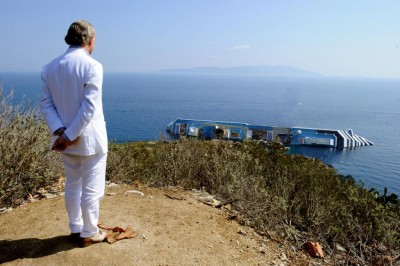
While the echoes of Fellini are strong, they’re not merely imitations. Each one has a point to make of its own. When Jep promises to take Ramona to see a sea monster, it turns out not to be the mysterious prehistoric creature washed up on the beach from La Dolce Vita, but the half-sunken Costa Concordia cruise ship lying on its side. Where Guido in 8 1/2 finds only disillusionment and dogma from an ancient prelate, Jep finds something more enigmatic from the supposedly 104-year-old Mother Theresa-like nun (Giusi Merli), whose apparent senility actually masks great perception and mystical devotion. None of this is simply evoking a master of cinema. Instead, Sorrentino reworks his ideas and images to fresh purposes. This is quite simply glorious filmmaking, and I’ve only touched the surface. Not Rated, but contains adult themes, nudity, sexuality, language and drug use.
Playing at Fine Arts Theatre.



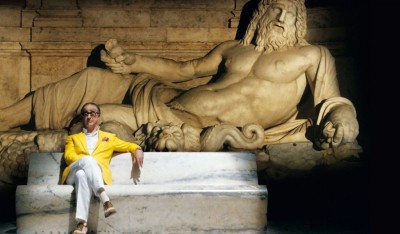
Before you comment
The comments section is here to provide a platform for civil dialogue on the issues we face together as a local community. Xpress is committed to offering this platform for all voices, but when the tone of the discussion gets nasty or strays off topic, we believe many people choose not to participate. Xpress editors are determined to moderate comments to ensure a constructive interchange is maintained. All comments judged not to be in keeping with the spirit of civil discourse will be removed and repeat violators will be banned. See here for our terms of service. Thank you for being part of this effort to promote respectful discussion.